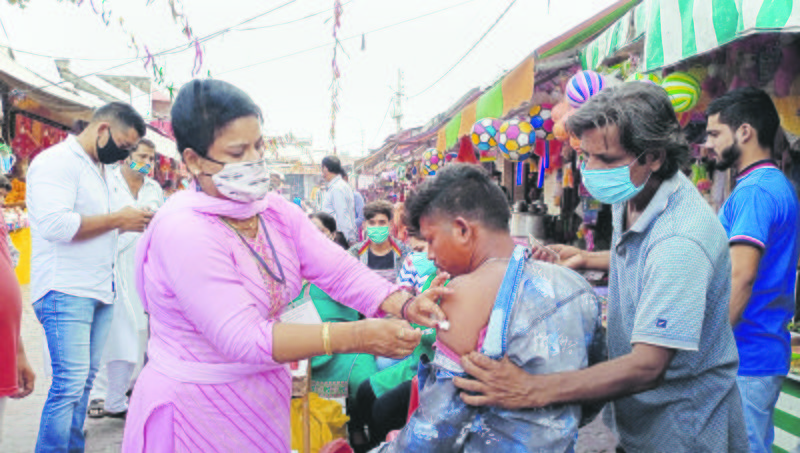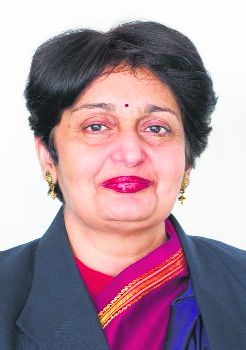
Equitable: The free vaccine-for-all strategy ensured easy access to vaccination services. PTI
Preeti Sudan
Ex-Secretary, Health & Family Welfare
India will soon cross a billion doses of Covid vaccinations. This is no small feat. The journey towards this target has been anything but easy. The delivery of a billion doses of vaccine to the people of the nation sets a world record, but more importantly, it is testimony to the country’s resilience, self-reliance and capacity to face and overcome enormous obstacles posed by the pandemic.
It was on January 17, 2020, that India issued its first nCoronavirus (the disease was unnamed then) advisory as part of a proactive, pre-emptive and graded response to an evolving threat. Exactly a year later, on January 16, 2021, India embarked upon the world’s largest vaccination drive, launched by the PM. In less than a year, and before October 2021 ends, a billion doses of the Covid vaccine would have been administered to our people.
The story behind the ‘billion doses’ has many parts to it. The first is the supportive facilitation to fast-track vaccine development and manufacture. From the establishment of the Task Force for Focused Research on Corona Vaccine in April 2020 to the development of the vaccine in less than a year of the pandemic reflects the capacity of our research and development processes in the public and private sectors.
Sharing virus samples, collaborating with and supporting indigenous industry, facilitating trials and easing regulatory processes resulted in the Serum Institute of India’s Covishield, Bharat Biotech’s Covaxin (recently approved for kids aged 2-12 also), ZydusCadila’s ZyCoV-D for the 12-18-year-olds and at least three more indigenous vaccines that are at the clinical stage.
As a first, supporting at-risk manufacturing of Covid-19 vaccines by Biological E, an order for 30 crore doses to the tune of Rs 1,500 crore has been approved. Of course, India is not alone in such an endeavour. Some other countries have also accomplished this task. Indeed, it is a true testimony of global scientific research and rigour.
Another key factor in this achievement rests on India’s decades long experience with immunisation programmes, mostly targeted to specific sub-population groups of children and pregnant women. The National Technical Advisory Group on Immunisation (NTAGI) has been guiding India’s universal immunisation programme in terms of the vaccine policy. Dovetailed with a Covid-specific National Task Force on Vaccine Development (NEGVAC), these two groups are the force behind the evolving Covid vaccine policy.
Their key roles were to ensure free vaccination for all, make every possible effort in augmenting more production of vaccines, guiding evidence-informed decisions, such as prioritising vulnerable groups, identified by NEGVAC (in keeping with WHO guidelines and later expanding beyond these, as other countries did), providing graded flexibility to the states and the private sector to participate in the effort, ensuring that the vaccination drive is policy-driven, overseeing the creation and maintenance of a data base and tracking mechanism to ensure delivery of the second dose among vaccinated individuals and emphasising that the fundamental protocols for the prevention of the spread of Covid-19 are scrupulously followed during the vaccination drive.
Vaccine hesitancy was evident in the early months of initiating the vaccination process. An effective communication strategy based on rapid assessments to understand the prevalent reasons for vaccine hesitancy was implemented. This created awareness among the beneficiaries, leading to a demand for the vaccine. Central and state governments, assisted by civil society, undertook a well-planned, coordinated, synergistic set of actions, involving district and sub-district officials and an army of frontline health workers who carried out the vaccinations while working to tackle hesitancy and win public trust. We owe a huge debt to the medical fraternity and frontline workers who have tirelessly worked to keep us safe.
The focus on ensuring equitable access to Covid-19 vaccine to all citizens — Sabko vaccine, muft vaccine — emphasised easy access to vaccination services by all, including vulnerable groups such as persons without identity cards, prisoners, transgender population, the differently abled, the destitute and the homeless.
The Centre maintained a high level of attention to ensuring an adequate supply of Covid-19 vaccine doses with states and UTs by setting up systems to monitor the pace of vaccination and maintaining a balance between oversupply and insufficient quantities of vaccines.
Before the Covid vaccination initiative, the country’s immunisation programme delivered vaccines to newborn babies, infants, children under 5 and pregnant women. The delivery of the Covid vaccine posed several new challenges, including identifying the elderly, both women and men, and those with chronic diseases to prioritise them and then address the remaining adult population.
These challenges were met through an organised, systematic process that utilised communication strategies, expanding service delivery platforms and undertaking ongoing rigorous monitoring, support and mentoring through the use of digital tools.
The CoWin platform has ensured the tracking of every precious dose of vaccine, minimising wastage, real-time collaboration between the Centre and the states and the private sector. Going global, CoWin is poised to help other nations deliver vaccines efficiently through technology.
The service delivery platforms of India’s immunisation programme range from all three tiers of health facilities and through outreach to ensure last-mile reach. In order to supplement these platforms for Covid vaccination, innovative strategies such as the utilisation of common service centres and the establishment of 1075 helpline for simpler registration along with the CoWin portal, the availability of ‘workplace CVCs’ and near-to-home Covid vaccination centres came up.
This was done through an efficient system with multiple trained vaccination teams stationed at over 2.62 lakh Covid-19 vaccination centres countrywide. The capacity of the vaccination teams and the programme management structure was conducted in a cascade manner — from the training of trainers at the national level to the vaccination teams working at the ground level.
It needed collaboration for efficient training, regular reviews and adoption of required and planned measures and people’s participation on a whole. The states and UTs have done a remarkable work in mobilising the beneficiaries for vaccination and making this drive a jan andolan (people’s movement).
Join Whatsapp Channel of The Tribune for latest updates.



























